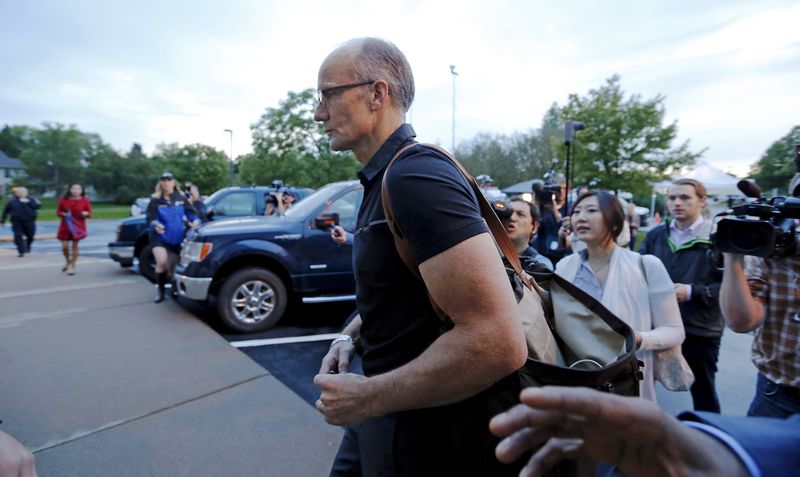By Todd Melby
BLOOMINGTON, Minn. (Reuters) - The Minnesota dentist who killed Zimbabwean lion Cecil, sparking a global outcry from animal lovers, returned to work on Tuesday to shouts of "murderer" and "leave town" from a half dozen protesters, but support from some patients at his suburban Minneapolis office.
Walter Palmer, 55, did not speak to reporters as he entered his Bloomington, Minnesota, dental practise. He shut the practise in late July amid a firestorm of protests after he was publicly identified as the hunter who killed the rare black-maned lion weeks before.
The death of Cecil, a familiar sight at Zimbabwe's Hwange National Park, triggered threats on social media, stoked controversy over big-game hunting and prompted three U.S. airlines to ban transport of African big game killed by trophy hunters.
Zimbabwe's environment minister said in July the country was seeking Palmer's extradition as a "foreign poacher." But Palmer would have to be charged before he could be extradited and Zimbabwe has not done this.
The River Bluff Dental practise reopened in mid-August without Palmer, who said on Sunday in a joint interview with the Minneapolis Star Tribune and the Associated Press that he needed to resume his duties.
Veronique Lamb, a 49-year-old tourist from Brussels, was among a handful of protesters waiting for him on Tuesday. She said she was there to protest the dentist returning to work "like nothing happened."
"He did something really bad and he really knows it," Lamb said. "Hopefully this has opened the eyes of people to this horrible business. It's very sad."
Palmer was also greeted with support.
A patient of his, Ryan Rice, said as he left a dental appointment that he was heartbroken for Palmer. A St. Paul resident and hunter, Rice said money paid for hunting licenses often goes to conservation efforts.
"I have no problem with him taking a lion or giraffe, that's his own business," said Rice, 30. "I do have a problem with social media and how people have tried to slander this individual."
In the interview on Sunday, Palmer reiterated a statement he had made in July: that the hunt was legal and no one in the hunting party realized the targeted trophy kill was the well-known 13-year-old lion.
Regulated big-game hunting is permitted in Zimbabwe and a string of other African countries.
'OFFENDED' BY PROTESTS
Cathy Pierce, 63, of East Bethel, Minnesota, said she would like to see Palmer lose his business. "Maybe that would send a message that this kind of hunting is not accepted anymore," Pierce said.
Several messages were taped to the entry door to the building, including "Justice for Cecil #extradition."
Dr. Thomas Dressel, a retired plastic surgeon, said he went in person to the office to make an appointment after failing to reach it by telephone. He said he had no issue with hunting, as long as it is legal.
"I am somewhat offended," Dressel said of the protesters. "Who are they to tell me who to see and who not to see?"
A professional hunter in Zimbabwe was charged with breaching hunting rules in connection with the hunt in which Cecil was killed. A game park owner was also charged with allowing an illegal hunt. Both have denied the charges.
Zimbabwe Conservation Task Force chairman Johnny Rodrigues has said Cecil was lured with bait from Hwange National Park, a preserve where he could not be hunted, and shot in an adjacent game farm.
Palmer said in the interview on Sunday that he wounded the lion with a bow and arrow, tracked it and then delivered a final blow with another arrow over the course of far less than the 40 hours that has been widely reported by media.

Bloomington Police were at Palmer's office on Tuesday and had a security camera in the parking lot, Deputy Chief Mike Hartley said. The department has not received any reports of threats to Palmer's life, he said.